
Dec 14, 2021
Some 600 Maldivian fishers from the Bodukanneli Masveringe Union (BKMU) protested offshore from the capital, Male, December 10, demanding that the government of the island nation address 11 demands.
Fishers say the government must address job safety and health concerns and stop environmentally damaging practices that impact fisheries, such as land reclamation projects, and introduce penalties for those who dump plastic in the ocean.
Protesters also are asking the government to reconsider a previously rejected proposal on educating and training fishers on sustainable fishing practices. BKMU submitted a proposal to the government for funding to conduct education programs for fishers on sustainable fisheries, safety at work and fishing for “A grade” fish, but the government rejected the proposal.
 Maldivian President Ibrahim Mohamed Solih, who was present at the protest, addressed the gathering.
Maldivian President Ibrahim Mohamed Solih, who was present at the protest, addressed the gathering.
“The government will listen to workers voices, and workers from all sectors, be it fishermen, tourism workers, agriculture workers or any other sector. They have the right to have these protests and raise concerns and demands.”
The president welcomed the protest and said he would fulfill fishers’ demands by incorporating them into the government’s long- and short-term goals.
Unions affiliated with the Maldives Trade Union Congress (MTUC), a Solidarity Center partner, took part in the protest.
The fishers also are asking the government to:
- Provide incentive pay for sustainable, clean catch
- Set prices that do not harm to the environment
- Revitalize the tuna industry—prioritize the fisheries industry as much as the tourism industry
- Take steps to protect the environment, for example, by banning the dumping of plastics in the sea
- Enact the Industrial Relations Act and Occupational Health and Safety Act.
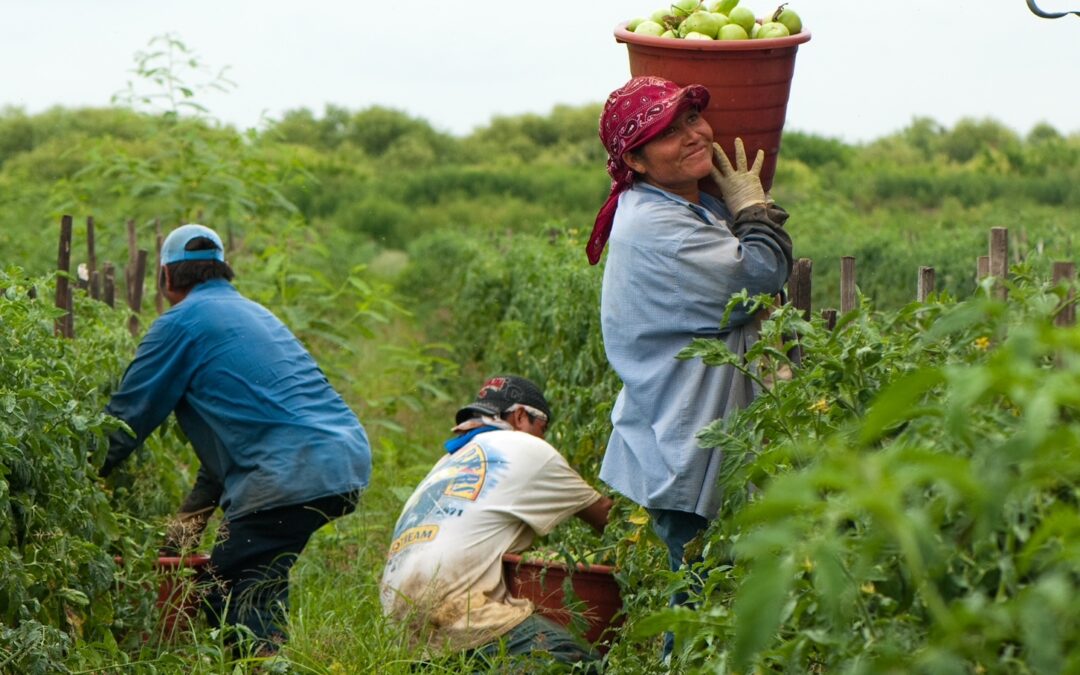
Dec 10, 2021
Millions of workers around the world engage in paid labor—yet do not receive their wages. In addition, getting employers to pay workers what they are owed often is difficult—especially for those who have migrated for work, according to a new report from the Migrant Justice Institute.
“All of the risks and costs of wage recovery are placed with the party least able to bear them: the migrant worker,” says Laura Berg, co-executive director of the Migrant Justice Institute and co-author of the report, “Migrant Workers’ Access to Justice for Wage Theft.”
The report draws on a year of global consultations and analysis across all regions, identifying common drivers of wage theft to propose specific, practical reforms that can underpin global, national and local wage theft campaigns. It is co-authored by Migrant Justice Institute Co-Executive Director Bassina Farbenblum.
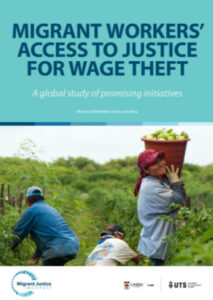 Wage theft—which also includes being paid less than the minimum wage, or not being compensated for overtime or sick leave—increased during the COVID-19 pandemic, especially for migrant workers who were required to return to their home countries at the start of the pandemic and who then had no recourse for obtaining their unpaid wages.
Wage theft—which also includes being paid less than the minimum wage, or not being compensated for overtime or sick leave—increased during the COVID-19 pandemic, especially for migrant workers who were required to return to their home countries at the start of the pandemic and who then had no recourse for obtaining their unpaid wages.
But the magnitude of wage theft prior to the pandemic makes clear it happens by design.
“Wage theft is not just the result of a few bad employers. It’s part of a business model in many supply chains,” said Elizabeth Frantz at the Open Society Foundations. Frantz moderated a Migrant Justice Institute virtual panel December 7 to launch the report. (Watch the full event here.) OSF funded the report and virtual panel.
Speaking at the event, Jill Wells, with Engineers Against Poverty, described how a complex system of supply chain contracting in Qatar, where she worked on construction for the 2022 World Cup, often led to wage theft for migrant workers. Without laws and enforcement mechanisms to ensure migrant workers get compensated, even private organizations can only go so far to assist migrant workers, said Ben Harkins at the International Labor Organization (ILO), which has established Migrant Resource Centers in several Asian countries.
“Let’s be clear—this is not just a simple issue of wage arrears as many try to classify the issue, as if it’s just a clerical error. This is theft. And it’s outrageously common and getting worse during the pandemic,” said Solidarity Center Executive Director Shawna Bader-Blau, who took part in the panel. The Solidarity Center and the International Lawyers Assisting Workers (ILAW) network supported the report and organized the regional consultations.
Holding Employers Accountable, Expanding Labor Laws
A big barrier to accessing justice is migrant workers’ fear of employer retaliation. “Most migrant workers are unlikely to file a claim because they fear being deported, losing their job or other forms of retaliation,” the report says.
Although the report finds no single solution will ensure migrant workers receive their due compensation or can access justice if they do not, it details measures government officials and employers should take. For instance, migrant workers should receive permission to stay in country to pursue wage claims. If they return home without pay, they should be able to lodge wage claims through video testimony or online courts.
Because the system generally favors employers, migrant workers are forced to prove their claims, and it is extremely difficult for migrant workers to provide evidence of their work and the unpaid wages. The report recommends shifting the burden of proof to employers with legal presumptions in workers’ favor regarding duration of employment hours worked, wages owed and so on.
Holding employers accountable also is essential. “Employers facing a wage judgment simply liquidate or refuse to pay. They won’t be held responsible by suppliers or contractors,” said Berg. The report lists options for enforcing a determination and collecting payment, such as holding licensing of employers, deregistering a business and suspending orders until workers receive what they are owed.
Freedom to Form Unions Key to Migrant Worker Rights
Governments must extend labor law coverage to all workers, according to the report. Most migrant workers are not protected by labor laws, which establish minimum wages, job safety and health guidelines, and social protection coverage like paid sick leave and time off. And, most migrant workers are prohibited from forming unions to collectively champion decent working conditions.
The most marginalized workers are especially vulnerable to wage theft, and debt incurred when they are unpaid renders them vulnerable to forced labor, said Franz.
“This study focuses on initiatives by governments and state actors, but recognizes that often those mechanisms just aren’t enough,” said Bader-Blau. “To truly recover stolen wages and ensure migrant worker justice, this has to be combined with collective action of migrant workers around the world.”
Fundamentally, says Bader-Blau, “We must continue to support freedom of association, the right to organize and collectively bargain for all workers regardless of their nationality, gender, sector or immigration status as the primary mechanism to prevent and address rampant wage theft of migrant workers.”
Says Frantz: “It’s clearly time for business and government to recognize that it is ethically unacceptable to let the risks and burdens of wage recovery lie with migrant workers rather than business and government.”
Panel participants also included Terri Gerstein from the Harvard Labor and Worklife program; Douglas Maclean, Justice Without Borders; and Apolinar Tolentino, Building and Wood Working International.
The report is part of an ongoing global campaign titled Justice for Wage Theft organized by Building and Wood Workers’ International (BWI), Migrant Forum in Asia, Lawyers Beyond Borders Network, Cross Regional Centre for Migrants and Refugees, South Asia Trade Union Council (SARTUC), ASEAN Services Employees Trade Union Council and the Solidarity Center.
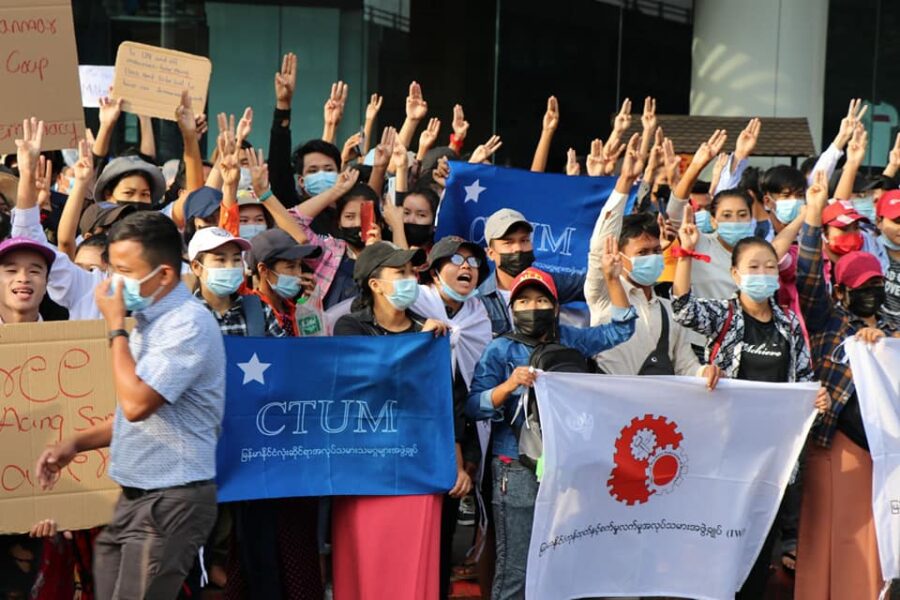
Dec 7, 2021
Democracy enables workers and their unions to flourish, and as it is increasingly threatened around the world, democracy also depends on working people and their organizations to keep it vibrant, according to speakers at the high-level event, “Worker Organizations’ Vital Role in Democracy.” (Watch for the full recorded session here.)

“We stand with all workers everywhere who are on the front lines of democracy”—AFL-CIO President Liz Shuler. Credit: Solidarity Center
“Threats to democracy go hand-in-hand with threats to workers’ right to form unions,” said AFL-CIO President Liz Shuler, speaking at the November 7 virtual forum. “We stand with all workers everywhere who are on the front lines of democracy in their countries and their workplaces.”
The forum, an official side event of the November 9-10 U.S. Summit for Democracy, brought together union leaders, labor ministers and philanthropic organizations from around the world to highlight the role of worker voice and worker rights as fundamental components of democracy and spur global action in support of freedom of association and collective bargaining.
“Worker Organizations’ Vital Role in Democracy” built on recommendations that emerged from four listening sessions with 250 U.S. government officials and labor leaders from Asia, Africa, the Americas, Europe and the Middle East and North Africa. The Solidarity Center, International Trade Union Organization (ITUC) and the AFL-CIO assisted in organizing the sessions.
“The freedom to form unions is a human right,” said U.S. Labor Secretary Marty Walsh, opening the event. “For global democracy to thrive, the global community must support workers right to independent organizing and bargaining.” In announcing the launch of the Multilateral Partnership for Organizing, Worker Empowerment and Rights (M-POWER) initiative, a year-long efforts by governments, unions and the private sector, Walsh said its goals include extending labor law coverage and strengthening unions.
“When we say workers need a seat at the table, we mean it.”
Democracy Under Threat: The Voice of Workers
During a session exploring worker rights, ITUC General Secretary Sharan Burrow highlighted how economic inequalities—such as the 60 percent of the world’s workers who survive through informal jobs with no rights and no protections—threaten democracy. The ITUC and global labor movement are championing a new social contract, one that includes “Jobs, jobs, jobs, jobs,” said Burrow.
It’s time to return to full employment” with rights and protections for all workers, she said, with a new social contract that includes equality and inclusion for all workers, a push reiterated by International Labor Organization Director General Guy Ryder.
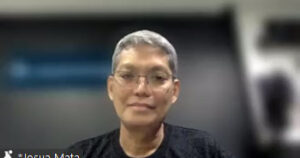
Josua Mata at SENTRO says union members are standing up to brutal assaults on democracy and freedom of association. Credit: Solidarity Center
From the Philippines, Josua Mata, general secretary of the United and Progressive Workers Center (SENTRO), described a bleak environment for workers and their unions, with more than 50 union members killed since 2016 and ongoing redtagging (branding and accusing individuals and/or organizations of being terrorists), illegal firing of union activists and anti-terrorism laws directed at stifling freedom to form unions and bargain.
“Any claim that there is freedom of association in Philippines is a lie,” said Mata. Despite the dangers, he and other union activist there are determined to persist in the struggle for democracy.
“All of this has not stopped us from continuing to do what needs to be done.”
A union leader from Brazil shared her struggle with state corruption. Yet, like Mata, Carmen Foro, general secretary of the Central Union of Workers (CUT) vowed to continue the fight for transparent and free government to enable workers to freely exercise their rights.
“Unions are indispensable to democracy,” said Foro.
In a rallying cry to workers in the United States and around the world, Randi Weingarten, president of the U.S.-based American Federation of Teachers (AFT) said workers must see the struggle to engender and preserve democracy “the same as we would fight for a collective bargaining contract. The fight for democracy is the same as the fight for wages, the fight for dignity.”
Said Solidarity Center Executive Director Shawna Bader-Blau: “No social or political progress happens by magic. Change is pushed by people working collectively. And legitimacy of the government comes from the people.”
Launching a Global Year of Action
Partners in the M-POWER initiative will come together in a year to evaluate progress and recommit to improving worker rights worldwide. Announcing a $100 million pledge by philanthropic organizations through Funders Organized for Rights in the Global Economy (FORGE), Open Society Foundation Executive Director Thomas Periello said the commitment is an important statement for philanthropy to do its part keep worker rights and justice central to its work around the world.”
“As we see rise of threat of authoritarianism around the world, democracies need to deliver, and a huge part of that is free unions,” he said.
Government officials from the U.S. Agency for International Development (USAID), the State Department and Labor Department’s Bureau of International Labor Affairs (ILAB) shared their support of M-POWER’s goals and highlighted the U.S. government’s significant financial commitment to program.
“Governments have a foundational role in providing an enabling role for enabling free and independent unions to thrive,” said Thea Lee, ILAB deputy undersecretary.
Labor ministers from Argentina, Germany, Mexico and Norway also shared how partnerships among union, government and private sector in their countries are enabling workers to reskill and upskill, transfer to jobs in renewable energy and ensure worker rights throughout. “To protect the rights of workers, the first thing we need is a development model to have rights at center,” said Argentina’s Minister of Labor, Employment and Social Security Claudio Moroni.
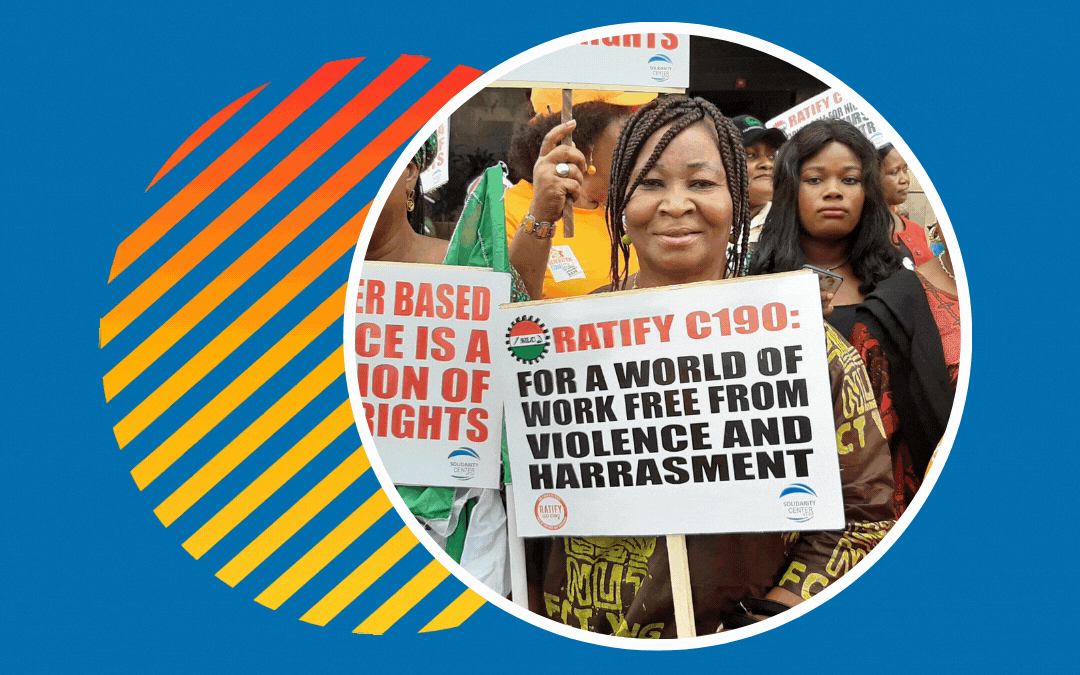
Nov 17, 2021
Union women are not waiting for their governments to ratify Convention 190, the international treaty that addresses gender-based violence and harassment in the world of work—they are taking action now to ensure workers benefit from the powerful rights it provides, according to Rita Goyit, speaking on this week’s Solidarity Center Podcast.
“We are taking concrete measures while we wait for the ratification,” says Goyit, head of the Nigeria Labor Congress (NLC) Department of Women and Youth and secretary of the NLC’s National Women Commission.
With support of the NLC and Solidarity Center, union activists conducted an informal survey of more than 900 women workers in Abuja and Lagos and found 57 percent had experienced GBVH at work, yet 20 percent did not report it for fear of employer retaliation.
“What was common about the story is that sexual harassment, gender-based violence exists in the workplace,” Goyit tells Solidarity Center Executive Director and podcast host Shawna Bader-Blau. “And it was not treated as a workplace issue.”
Through outreach and training, Nigerian unions are reaching workplaces as diverse as garment factory floors and sprawling informal markets, where workers put in place what works for them, like anonymous suggestion boxes to report harassment.
Goyit says union women are developing strategies that “will really address gender-based violence in the workplace because this is a worker-specific issue, it’s coming from with the workers ourselves.
“We’re putting our heads together until we find the solution … because the women are with us. Because I feel strong when I see the other women around me in our campaigns, in the negotiations that we do.”
More from The Solidarity Center Podcast!
Listen to this and all Solidarity Center episodes here or at Spotify, Amazon, Stitcher, Castbox or wherever you subscribe to your favorite podcasts.
Download recent Season Two episodes:
The Solidarity Center Podcast, “Billions of Us, One Just Future,” highlights conversations with workers (and other smart people) worldwide shaping the workplace for the better.
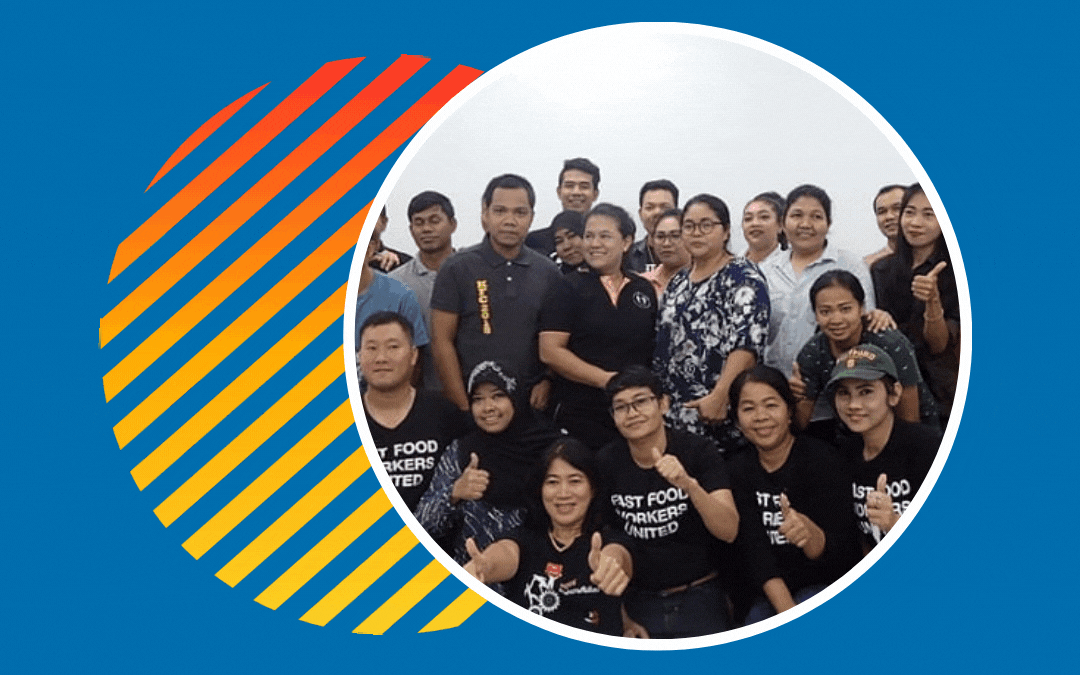
Nov 10, 2021
The Fight for $15 movement in the United States, in which workers seek a living wage and a union, is part of a global struggle by fast food workers often employed by the same multinational corporations that make massive profits even as their employees struggle to get by.
In Thailand, Apantree Charoensak, a former union leader who led the campaign to organize fast food workers at KFC, describes on this week’s Solidarity Center Podcast how workers overcame the company’s opposition to successfully form a union and win better wages and working conditions.
“The company knew that if the demands were successful, it would impact 70 percent of the workers which, back then, there were about 18,000 workers. So they pressured and threatened me a lot,” she tells podcast host and Solidarity Center Executive Director Shawna Bader-Blau. “They said they would get me out of the company, if I still tried to help other workers.”
Charoensak says the campaign drew lessons from the U.S. Fight for $15 campaign throughout the years-long effort to form a union.
“It took six years from [when] the union was first organized until we reached the threshold of 20 percent because in Thailand, the law requires that you have to reach over 20 percent of all the workforce before you can file for collective bargaining.”
Catch All Solidarity Center Podcasts!
Listen to this all Solidarity Center episodes here or at Spotify, Amazon, Stitcher, Castbox or wherever you subscribe to your favorite podcasts.
Download recent Season Two episodes:
The Solidarity Center Podcast, “Billions of Us, One Just Future,” highlights conversations with workers (and other smart people) worldwide shaping the workplace for the better.

 Maldivian President Ibrahim Mohamed Solih, who was present at the protest, addressed the gathering.
Maldivian President Ibrahim Mohamed Solih, who was present at the protest, addressed the gathering.

 Wage theft—which also includes being paid less than the minimum wage, or not being compensated for overtime or sick leave—increased during the COVID-19 pandemic, especially for migrant workers who were required to return to their home countries at the start of the pandemic and who then had no recourse for obtaining their unpaid wages.
Wage theft—which also includes being paid less than the minimum wage, or not being compensated for overtime or sick leave—increased during the COVID-19 pandemic, especially for migrant workers who were required to return to their home countries at the start of the pandemic and who then had no recourse for obtaining their unpaid wages.



